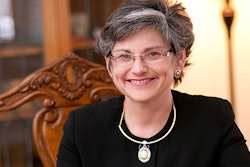In the months and years to come, the decisions Justice Sonia Sotomayor helps render as a member of the U.S. Supreme Court will play a role in shaping our society.
However, before even issuing her first opinion, the significance of Sotomayor’s appointment to the court was celebrated across the country. Her place on the bench marks a national milestone, but it especially resonates with young Hispanic women studying law and the “wise Latina” professors helping to prepare the next generation.
Today marks the beginning of a new term for the Supreme Court. For many female Hispanic lawyers and aspiring lawyers, it represents a new era regarding their place in the legal profession.
“The first thing that came to me when Sotomayor was nominated and was going to be a Supreme Court justice was that the image of Latinas was going to change,” said Monica Guzman, a second-year law student at Santa Clara University. “The words that were associated with what being a Latina was were going to be different.”
That one woman could make major strides in shifting the public perception of an entire demographic serves as an inspiration. For many of these women, Sotomayor’s appointment provides a tangible example of what is possible.
“I don’t think she ever saw a glass ceiling,” said Amy Tellez, a third-year law student at the University of Houston Law Center. “I hope that other Latina girls out there see that and are able to do something positive with it.”
There are few highly visible Latina role models in the legal profession. Hispanic women make up 7 percent of the U.S. population but only 1.3 percent of the nation’s lawyers.
“I think the most important result from all of this is it’s really brought the discussion of Latinas in the law profession to the forefront,” said Leticia Olivera, a second-year law student at Northwestern University. “Latinas are a very under-represented group in the legal community. Anyone that can get people talking about these women in the legal profession in such an empowering and positive way is going to have an effect.”
For the previous generation, the ascension of a Latina to the High Court is an emotional moment few believed they would ever see.
Barry University School of Law Dean Leticia Diaz said it was not until Sotomayor was nominated that she was able to see “this could really happen.”
Jenny Rivera, a professor at the City University of New York Law School who clerked for district judge Sotomayor in the early 1990s, is still pinching herself.
“I worked for her and knew how special and brilliant this individual was,” Rivera said. “This was a unique individual who was larger than life, but I did not think that I would see this day in my lifetime.”
“It’s one of these things that I ask myself, ‘Why didn’t I think it would happen in my lifetime when it’s 2009?’” Rivera continued. “And it’s because obstacles still remain. … We’re still feeling the consequences of racism, anti-Latino and anti-immigration sentiment and sexism in this country. It takes a long time to get past that.”
Such realizations serve to reinforce why Sotomayor is an important addition to the Supreme Court.
“In classes, we’re studying cases from the Supreme Court, but you’re not seeing that representation [of a Hispanic voice], and you’re having to read a narrative of a case where there’s an absence of understanding of certain segments of the community,” said Natalie Gomez-Velez, academic affairs dean at CUNY Law School. “To have this step forward is tremendous.”
The importance of diverse voices on the Supreme Court cannot be stressed enough, say professors and students.
“One voice would just give you one answer, one way of looking at things,” Diaz said. “I don’t think you could really achieve justice that way.”
The next step is integrating that voice into the court and getting beyond race and gender.
“At the end of the day, while we should be focused and concerned about who these individual justices are, it’s ultimately about opinions they issue, because they affect every single one of us,” Rivera said.



















